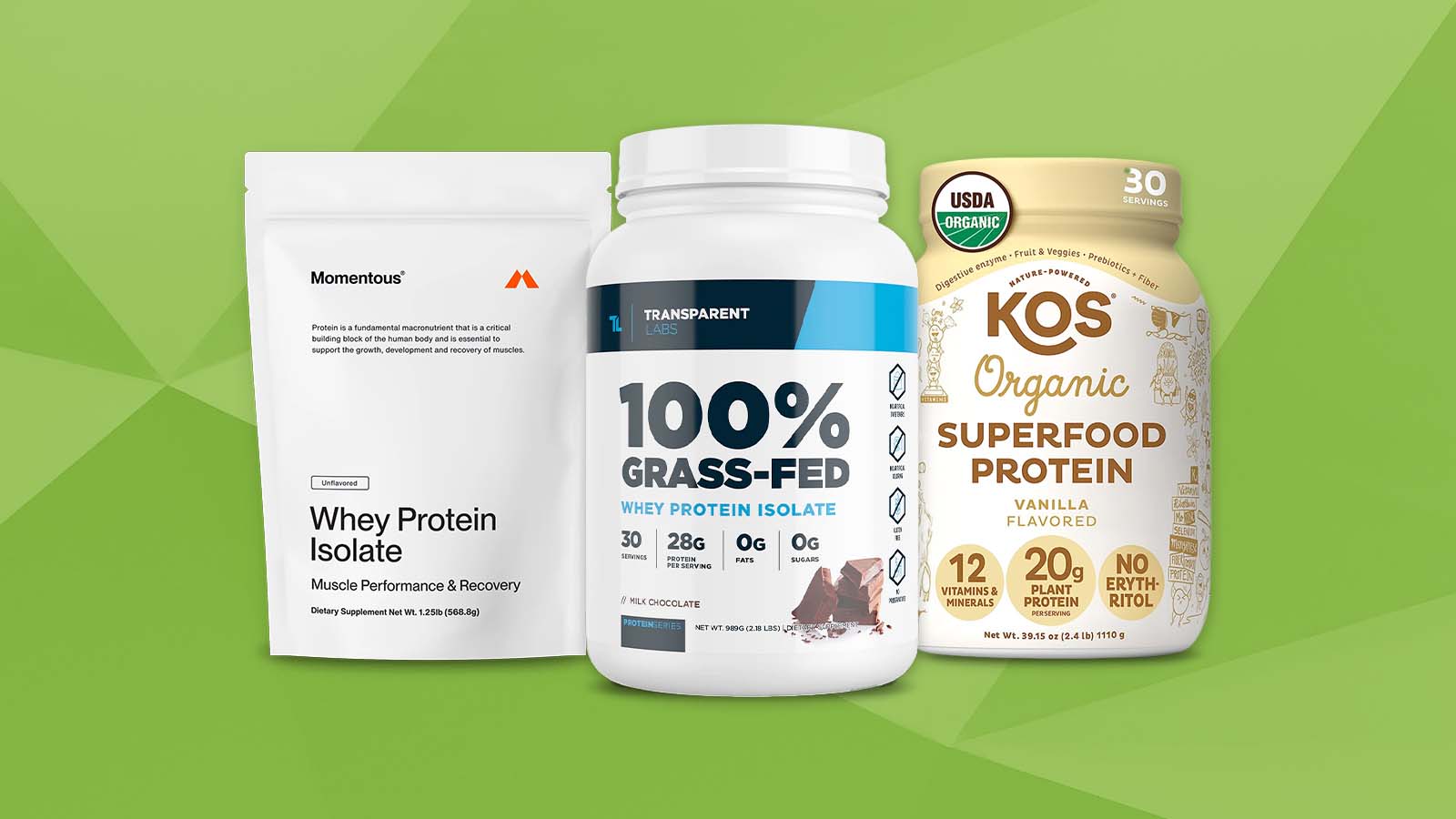What makes a protein “clean”? That’s a good question that can be approached in several ways, but we find that the best clean protein powders tend to have a small list of ingredients — three to five is ideal — and are free of artificial, impossible-to-pronounce additives. Purveyors of clean proteins are transparent about how they source them and don’t aim to confuse consumers with complex labels filled with tiny print.
Clean or not, though, protein comes from various sources that each provide their own particular benefits. If you’re looking to build muscle on a calorie deficit, you’ll probably want a whey isolate powder. If you’re vegan or have dairy sensitivities, a plant protein option is your best bet. Regardless, all the powders on this list provide the kind of protein boost that can help increase lean muscle mass, maximize muscle hypertrophy, and burn fat. (1) See our picks for the best clean protein powders below.
Best Clean Protein Powders of 2023
Editor’s note: The content on BarBend is meant to be informative in nature, but it should not be taken as medical advice. The opinions and articles on this site are not intended for use as diagnosis, prevention, and/or treatment of health problems. It’s always a good idea to talk to your doctor before beginning a new fitness, nutritional, and/or supplement routine. Individual needs for vitamins and minerals will vary.
How We Tested the Best Clean Protein Powders
BarBend’s team of nutrition experts, bodybuilders, and fitness enthusiasts have tested nearly 100 protein powders to find the cleanest and most effective brands in a very crowded market. During that search, we stretched ourselves to sample supplements that source protein from a variety of different sources. That includes whey concentrate, isolate, and hydrolysate proteins, as well as casein protein and many plant-based sources, such as peas, rice, and quinoa.
Our testing methodology took into account several factors. First and foremost, we scoured each product’s list of ingredients to ensure it wasn’t reliant on GMOs, gluten, added sugars, or artificial sweeteners. We valued transparency in this process, and selected brands that took pains to clarify how they sourced their protein and how it was processed. Finally, we took account of its protein-to-calorie ratio and taste to ensure it checked the boxes of what we prize in any protein powder.
Best Clean Protein Powder Overall: Transparent Labs Whey Protein Isolate
Transparent Labs Whey Protein Isolate
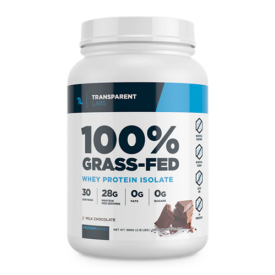
Transparent Labs Whey Protein Isolate
With 8 different flavors and 28 grams of whey protein from hormone-free, grass-fed cows, Transparent Labs Whey Protein Isolate is an excellent way to hit your protein macros.
Specs
- Price Per Serving: $2
- Servings Per Container: 30
- Protein Type: Grass-Fed Whey Isolate
- Grams of Protein: 28
- Flavors: Milk Chocolate, Dark Chocolate, Strawberry Milkshake, Chocolate Peanut Butter, Cinnamon French Toast, Mocha, Peanut Butter, Vanilla Peanut Butter, French Vanilla, Oatmeal Chocolate Chip Cookie, Vanilla Oatmeal Cookie, Blueberry Pancakes, and Unflavored
Pros
- This clean whey protein isolate has no artificial sweeteners, gluten, or added sugars.
- Its whey isolate comes from grass-fed cows on American farms.
- You get 28 grams of protein with only 120-150 calories and nearly no fat or carbs.
- There are 13 flavors to choose from.
Cons
- If you’re bulking up, this powder’s near-total lack of carbs and fats may not suit your goals.
- It has no digestive enzymes, which might be of concern to those with sensitive guts.
As its name suggests, Transparent Labs aims to be as transparent as possible when it comes to ingredients and sourcing. You’ll see only a small handful of ingredients when browsing the labels of its Whey Protein Isolate’s flavors, and not a single one of them is artificial in nature. This protein powder is as clean as they come.
The whey isolate, which has been filtered to reduce its lactose and fat content, comes from grass-fed American cattle that hasn’t been treated with hormones or antibiotics. Its efficacy and safety has been certified by supplement testing labs like Labdoor and Informed Sport.
A lean powder that’s ideal for muscle growth, Transparent Labs Whey Protein Isolate packs 28 grams of protein in every serving while minimizing the other macronutrients. Depending on the flavor, you’ll find between 0-2 grams of fat and 0-3 grams of carbohydrates. Calorie-wise, a serving contains as little as 120 calories and as much as 150. Those are good ratios for anyone looking to lose fat while gaining muscle.
Transparent Labs Whey Protein Isolate is also notable for its surplus of flavors. While many whey protein isolate powders offer roughly three to six flavors, Transparent Labs lets you choose from 13. You can opt for basics like Milk Chocolate or Vanilla Bean, or get adventurous with Blueberry Pancakes or Mocha.
We loved the Peppermint Hot Chocolate flavor. “It’s exactly that,” said our tester. “All you need is some whipped cream and marshmallows to complete the scene.” We had no issues mixing, either. Several customers concur. “It’s not often that you find a product with both clean ingredients and a great taste but Transparent Labs has found the solution,” reads one five-star review.
With no artificial sweeteners, food dyes, gluten, added sugars, or preservatives, this whey isolate powder is one of the cleanest and most protein-dense products we’ve seen.
Read our full Transparent Labs Whey Protein Isolate Review.
Best Clean Vegan Protein Powder: KOS Organic Plant Protein
KOS Organic Plant Protein
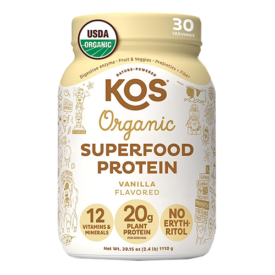
KOS Organic Plant Protein
This protein powder packs 20 grams of plant-based protein plus various superfoods, vitamins, and minerals. It also contains enzymes to aid digestion and promote gut health.
Specs
- Price Per Serving: $1.80
- Servings Per Container: 28
- Protein Type: Pea, Flax Seed, Quinoa, Pumpkin Seed, Chia Seed
- Grams of Protein: 20
- Flavors: Vanilla, Chocolate, Mint Chocolate Chip, Chocolate Peanut Butter, Blueberry Muffin, Salted Caramel Coffee, and Unflavored
Pros
- A strong alternative to whey protein for vegans and non-vegans alike.
- Its five plant-based protein sources provide a full amino acid profile.
- You won’t find any soy, gluten, dairy, cholesterol, trans fats, or artificial sweeteners.
- The digestive enzyme blend works to help you absorb more nutrients.
Cons
- It’s high in sodium, constituting 13 percent of your daily intake.
- Its macro split is heavier on fat and carbs than other options on this list.
Since whey protein is sourced from animal products, it can be tough for vegans to find a clean protein powder hospitable to their diet. KOS Organic Plant Protein is one of our favorite vegan options, as it offers a complete amino acid profile with a combination of five organic, plant-based proteins: pea, flax seed, quinoa, pumpkin, and chia seeds.
Depending on the flavor, KOS delivers between 140 and 165 calories per serving and packs 20 grams of protein, six to seven grams of fat, and six to eight grams of carbs (three of which come from fiber). You won’t find any soy, gluten, dairy, cholesterol, trans fats, or artificial sweeteners, though you will get a healthy dose of iron, which should be appealing to those on a plant-based diet.
Our tester calls this powder “unusually nutritious,” citing a bounty of vitamins and minerals that include vitamins B12 and E, zinc, selenium, and manganese. We also like the digestive enzyme blend in every serving. The combination of amylase, protease, lipase, lactase, and cellulase allows for better nutrient absorption.
KOS Organic Plant Protein isn’t just a solid vegan option, it’s an excellent powder for anyone in search of a clean shake.
Read our full KOS Organic Plant Protein Review.
Best Clean Grass-Fed Protein Powder: Momentous Grass-Fed Whey Protein
Momentous Grass-Fed Whey
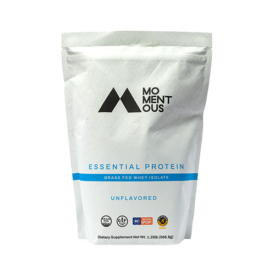
One serving of this supplement packs 20 grams of grass-fed protein with few added ingredients. You can buy a bag for $64.95, which is about $2.70 per serving.
Specs
- Price Per Serving: $2.70
- Servings Per Container: 24
- Protein Type: Grass-Fed Whey Isolate
- Grams of Protein: 20
- Flavors: Chocolate, Vanilla, and Unflavored
Pros
- Momentous sources grass-fed whey protein from hormone- and steroid-free cows.
- One of the leanest powders on the market, with only 100 calories and three grams of carbs per serving.
- The ProHydrolase digestive enzyme blend may enhance nutrient absorption.
- It’s fully NSF- and Informed Sport-certified.
Cons
- At $65 a bag, it’s definitely one of the pricier options on the market.
- There are only Chocolate, Vanilla, and Unflavored options.
Momentous sources its whey from dairy farmers in the European Union who utilize grass-fed cows untouched by hormones, steroids, and rBST. That commitment to quality has been recognized with certifications from Informed Sport and the National Sanitation Foundation, two of the leading sources in validating a supplement’s safety and efficacy.
Momentous Grass-Fed Whey Protein is one of the leanest powders on the market, delivering 20 grams of protein per serving with just 100 calories, three grams of carbs, and 1.5 grams of fat. A whey isolate, it was run through a cold and micro-processing filtration system that works to diminish its carb, fat, and lactose content while preserving the essential amino acids inherent to whey.
Momentous also adds a proprietary ProHydrolase enzyme blend to its whey isolate. Research has shown that ProHydrolase can produce elevated amino acid concentrations that contribute to muscle growth and aid digestion. (2)
The powder’s high-protein, low-calorie recipe makes it ideal for those working to lose fat without losing muscle along with it. It helps, too, that it actually tastes good. Though there are only three flavors available — Chocolate, Vanilla, and Unflavored — we found the powder to go down smooth when mixed with water.
Our tester described the chocolate powder as “great-tasting” and having a “rich” flavor that evokes hot chocolate. “I would buy this and I’d drink it again based on taste,” they added.
Momentous will cost you, though. A 1.5-pound bag with 24 servings costs $64.95, though you can save a few bucks by signing up for a $55.21 monthly subscription. At $2.70 per serving, it’s one of the more expensive powders on this list. But with its certifications, filtration process, and smooth taste, Momentous has certainly earned its price.
Best Clean Whey Protein Powder: Transparent Labs Whey Protein Isolate
Transparent Labs Whey Protein Isolate

Transparent Labs Whey Protein Isolate
With 8 different flavors and 28 grams of whey protein from hormone-free, grass-fed cows, Transparent Labs Whey Protein Isolate is an excellent way to hit your protein macros.
Specs
- Price Per Serving: $2
- Servings Per Container: 30
- Type of Protein: Grass-Fed Whey Isolate
- Grams of Protein: 28
- Flavors: Milk Chocolate, Dark Chocolate, Strawberry Milkshake, Chocolate Peanut Butter, Cinnamon French Toast, Mocha, Peanut Butter, Vanilla Peanut Butter, French Vanilla, Oatmeal Chocolate Chip Cookie, Vanilla Oatmeal Cookie, Blueberry Pancakes, and Unflavored
Pros
- At 28 grams with only 120 calories, it’s one of the most protein-dense whey isolate proteins we’ve seen.
- Several flavors contain no fat or carbs at all.
- Choose from 13 flavors, including Blueberry Pancakes and Mocha.
Cons
- Its total lack of carbs and fats may not be ideal for some athletes.
- It contains more cholesterol and sodium than some comparable brands, though still not a sizable amount.
Protein comes from two different dairy sources: whey and casein. Our favorite clean whey protein powder is Transparent Labs Whey Protein Isolate.
Whey isolate differs from whey concentrate in that it’s filtered in a way that maintains the whey’s protein concentration while dramatically reducing its fat and carbohydrates. This particular mixture delivers 28 grams of protein with only zero to two grams of fat, zero to three grams of carbs, and anywhere from 120 to 150 calories, depending on the flavor. If you’re trying to build muscle while on a caloric deficit, this kind of balance ensures you don’t end up drinking all of your calories.
You won’t find any gluten, artificial sweeteners, or added sugars in Transparent Labs Whey Protein Isolate, though it does contain 15 grams of cholesterol — about five percent of your daily intake. This is notable because there are whey isolate options with up to five grams less and vegan options with no cholesterol at all. You can also find whey isolate powders with a third of the 300 milligrams of sodium in this mix.
If you can live with that, you’ll be able to choose from 13 different flavors, which includes unique options like Vanilla Peanut Butter and Cinnamon French Toast. The appealing taste is a constant in five-star customer reviews. “Best tasting protein I’ve had,” reads one. Other reviews shout out the clean ingredients and smooth digestibility. Our tester enjoyed the taste of the Peppermint Hot Chocolate flavor. “All you need is some whipped cream and marshmallows to complete the scene,” they said.
We also want to recognize Transparent Lab’s customer service, which our tester described as “amazing.” Customers say the same. One five-star review noted that after receiving the wrong flavor, they had a “great” experience with customer service, who delivered a new tub of their preferred flavor “without hesitation.”
Best Clean Casein Protein Powder: Legion Casein+
Legion Casein+
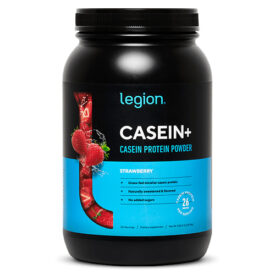
Legion’s Casein+ has more protein per calorie than any other casein we’ve seen, plus it has no artificial ingredients. Each serving provides 5.2 grams of branch chain amino acids.
Specs
- Price Per Serving: $1.50
- Servings Per Container: 30
- Protein Type: Casein
- Grams of Protein: 30
- Flavors: Milk Chocolate, Cinnamon, Strawberry, Vanilla, and Banana Cream Pie
Pros
- This grass-fed casein protein powder has no gluten, refined sugars, or artificial flavors.
- It packs 30 grams of protein in a powder that’s only 110 calories per serving.
- The casein was sourced from free-range, grass-fed cows.
Cons
- It contains no digestive enzymes, so consider your gut sensitivity before buying.
- Since it has nearly zero fat, it can taste flat and bland when mixed with water.
Casein is a strong alternative to whey in the protein realm. Not only does its texture lend itself to decadent recipes (think mug cakes and puddings), but it also digests more slowly and can be more filling than whey protein. (3)(4) When it comes to casein powders, we’re big fans of Legion Casein+.
In our review of Legion Casein+, we called it “one of our favorite protein supplements, period.” There are plenty of reasons why, but it’s rare to find a clean casein protein powder that packs a whopping 30 grams of protein per serving. In fact, at 110 calories per serving, Casein+ has more protein per calorie than any other casein product we’ve seen.
Legion’s casein comes from free-range, grass-fed Irish dairy cows that aren’t treated with any hormones or antibiotics. It contains three grams of carbs and less than a gram of fat, and has no GMOs, gluten, refined sugars, or artificial sweeteners. Instead, Casein+ derives its sweetness from stevia and monk fruit extract.
We tried the Banana Cream Pie and our tester found it “really good and really thick,” comparing its flavor to a “slightly underripe banana.” That said, it’s much tastier with full-fat milk than water. The thickness is to be expected from a casein protein powder, but mixing it might require a blender (or one heck of a shake).
Read our full Legion Casein+ Review.
Best Clean Budget Protein Powder: KOS Organic Plant Protein
KOS Organic Plant Protein

KOS Organic Plant Protein
This protein powder packs 20 grams of plant-based protein plus various superfoods, vitamins, and minerals. It also contains enzymes to aid digestion and promote gut health.
Specs
- Price Per Serving: $1.80
- Servings Per Container: 28
- Protein Type: Pea, Flax Seed, Quinoa, Pumpkin Seed, Chia Seed
- Grams of Protein: 20
- Flavors: Vanilla, Chocolate, Mint Chocolate Chip, Chocolate Peanut Butter, Blueberry Muffin, Salted Caramel Coffee, and Unflavored
Pros
- It costs $1.80 per serving, around $0.20 less than your average clean protein powder.
- KOS’ fully organic recipe has no soy, gluten, or dairy.
- Choose from a variety of flavors that include Blueberry Muffin and Salted Caramel Coffee.
- Its digestive enzyme blend may help you better absorb its nutrients.
Cons
- Servings contain up to 165 calories and up to nine grams of carbs, which might not be lean enough for those looking to drop weight.
- Its high sodium content constitutes 13 percent of your daily intake.
If budget’s a concern, you’re going to want a protein powder that packs plenty of bang for your buck. We recommend KOS Organic Plant Protein — its combo of pea, flax seed, quinoa, pumpkin, and chia seeds delivers a complete amino acid profile.
A two-pound tub of KOS Organic Plant Protein currently runs for $50.39. It provides 28 servings of two scoops each, which calculates to roughly $1.80 per serving. That’s a good deal when you factor in this powder’s clean proteins, lack of GMOs, and variety of flavors.
Speaking of flavors, KOS keeps your taste buds on their toes by rounding out their Chocolate, Vanilla, and Unflavored options with the likes of Blueberry Muffin, Salted Caramel Coffee, and Mint Chocolate Chip. Since KOS is free of artificial flavors, they sweeten with organic ingredients like stevia, monk fruit extract, and coconut sugar.
We tried the chocolate and vanilla flavors and found them above average in terms of taste. “It tastes like sacha inchi nut, or defatted peanut butter, mixed with oatmeal,” noted one tester. Both of our testers found the powder mixed well in water and milk, though each serving does include two scoops of powder. As such, a blender might be best for achieving a chunk-free consistency.
In addition to being one of the cleanest protein powders on the market, KOS Organic Plant Protein is also rich in nutrients (especially iron) and digestive enzymes. You won’t find many other powders under $2 per serving with such an energizing and nutritious profile.
Best Tasting Clean Protein Powder: Xwerks Grow
Xwerks Grow Protein Powder
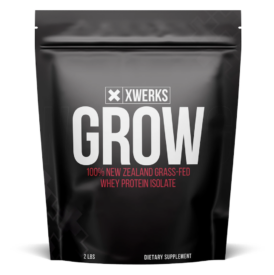
Xwerks Grow Protein Powder
This formula is 100 percent New Zealand Grass-Fed Whey Protein Isolate with 25 grams of protein per serving. It includes no hormones, antibiotics or pesticides and comes in four delicious flavors — Vanilla, Chocolate, Strawberry, and Peanut Butter.
Specs
- Price Per Serving: $1.97
- Servings: 30
- Protein Type: Grass-Fed Whey Isolate
- Grams of Protein: 25
- Flavors: Chocolate, Vanilla, Strawberry, and Peanut Butter
Pros
- This nutrient-packed powder has no artificial sweeteners yet still tastes great in milk.
- Its whey isolate comes from free-range, grass-fed cows raised with no hormones.
- It provides 25 grams of protein, with only 110 calories and nearly no carbs or fat.
- You’ll also benefit from six grams of BCAAs, which can aid recovery and muscle growth.
Cons
- There are no digestive enzymes, so beware if you have a sensitive stomach.
- It needs the fat of milk to bring out its creaminess; it’s bland and thin with water.
According to our tester, Xwerks Grow is the “finest protein powder” they’ve had the pleasure to drink. “The chocolate flavor tastes like a protein Yoo-hoo. It’s also incredibly smooth.” And that’s without the help of any artificial sweeteners. In fact, Grow’s trim list of ingredients is as clean as they come.
The primary ingredient of Grow is whey isolate, which is processed to have fewer carbs, fats, and lactose than whey concentrate or casein. Xwerks promises 25 grams of “almost totally pure protein” thanks to a micro-filtration process that results in zero to two grams of carbs and zero to two grams of fat, depending on the flavor. Grow also contains six grams of branched-chain amino acids — leucine, isoleucine, and valine — that research shows can improve post-exercise recovery and increase muscle mass. (5)(6)
Grow contains no soy, gluten, or artificial flavorings, relying instead on natural stevia. We find Grow tastes best in whole milk, where it can develop a creaminess thanks to the milk’s fat content. Our tester found it to be thin and bland in water.
We had mixed results when it comes to blending, but it’s worth noting that Grow lacks lecithin or other emulsifiers so it’s likely you’ll get a few granules. You also won’t find any digestive enzymes in Grow, which is worth taking into account if your gut doesn’t play well with protein powders.
Read our full Xwerks Grow Review.
Best Clean Meal Replacement Protein Powder: Ka’Chava Whole Body Meal
Ka’Chava Whole Body Meal
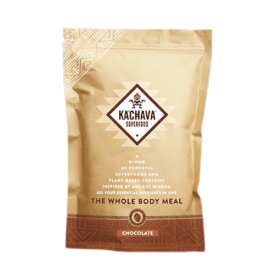
This vegan meal replacement offers various superfood blends that include organic fruits, vegetables, mushrooms, enzymes and probiotics. It totals 240 calories, 25 grams of plant-based protein, 25 grams of carbohydrates (including seven grams of fiber), and seven grams of fat.
Specs
- Price Per Serving: $4.66
- Servings Per Container: 15
- Protein Type: Peas, Brown Rice, Sacha Inchi, Amaranth, and Quinoa
- Grams of Protein: 25
- Flavors: Vanilla, Chocolate, Coconut Acai, Chai, and Matcha
Pros
- This meal replacement shake can replace a full meal with healthy doses of macros and micros.
- Its plant-based protein sources make for a complete amino acid profile.
- The recipe is rounded out with micronutrients like vitamin A, calcium, and iron.
Cons
- It’s expensive at nearly $70 for just 15 servings.
- We found the texture a touch gritty.
Ka’Chava Whole Body Meal is a nutrient-dense shake that works to satiate with a healthy dose of macros and a trim calorie count. It mixes quickly in a blender or shaker, making Ka’Chava a quick and easy meal alternative if you’re strapped for time or adhering to a calorie deficit.
A single shake contains only 240 calories. That may seem low, but Ka’Chava keeps you full with a balanced blast of macros — 25 grams of plant-based protein, up to 25 grams of carbohydrates (with seven grams of fiber), and up to seven grams of fat — and heaping helpings of 26 different vitamins and minerals, from vitamins A, C, and E to calcium, iron, and zinc.
Ka’Chava, which is vegan-friendly, rounds out its concoction with a handful of enriching blends that aim to maintain gut health, aid with digestion, and boost the immune system, among other benefits. What you won’t find is any dairy, gluten, soy, or artificial ingredients.
The shake’s five flavors include Vanilla, Chocolate, Coconut Acai, Chai, and Matcha. Our tester enjoyed the “pleasant” Chai flavor (though they found the texture “a bit gritty”), adding that it offered a nice change of pace from shakes that revolve around the twin poles of Chocolate and Vanilla.
That said, many customer reviews prefer those flavors. “I am super fond of the Vanilla and highly recommend that you use ice. These shakes taste great cold,” reads one five-star review.
Many reviews add that you can fold in almond butter, yogurt, and frozen fruit to give the shake some added calories if 240 is too little for your appetite. The price, on the other hand, might be a bit high for some. A bag with 15 servings costs $69.95, which comes out to $4.66 per serving, though you can knock it down to $4 per serving by committing to a monthly subscription.
Read our full Ka’Chava Whole Body Meal Review.
Best Clean Protein Powder for Athletes: Momentous Grass-Fed Whey Protein
Momentous Grass-Fed Whey

One serving of this supplement packs 20 grams of grass-fed protein with few added ingredients. You can buy a bag for $64.95, which is about $2.70 per serving.
Specs
- Price Per Serving: $2.70
- Servings Per Container: 24
- Protein Type: Grass-Fed Whey Isolate
- Grams of Protein: 20
- Flavors: Chocolate, Vanilla, and Unflavored
Pros
- Whey isolate digests faster than other proteins, which can help accelerate recovery after workouts.
- ProHydrolase enzyme blend can assist with protein absorption and digestion.
- Its balance of 20 grams of protein with only 100 calories can help if you’re on a calorie deficit.
- It’s NSF- and Informed Sport-certified.
Cons
- A 1.5-pound bag with 24 servings isn’t particularly budget-friendly at $65.
- There is not much variety flavor-wise.
Any athlete who’s had to put on muscle and burn fat during pre-season knows how tough it is to load up on protein without breaking a calorie deficit. Momentous Grass-Fed Whey Protein can help, as each serving delivers 20 grams of protein with only 100 calories, three grams of carbohydrates, and 1.5 grams of fat.
This supplement comes in the form of whey isolate, which produces a leaner product than whey concentrate due to its processing, which works to eliminate greater amounts of carbs, fats, and lactose. This mode of processing — Momentous describes its own as a combo of “cold and micro-processing filtration” — preserves the protein’s essential amino acids so it can absorb faster after intense rounds of training.
This accelerated absorption can contribute to muscle growth by producing elevated amino acid concentrations. Momentous’ proprietary ProHydrolase enzyme blend may also speed up absorption, potentially boosting muscle growth even more. (2)
We’re also big fans of this product’s taste. Our tester compared Momentous’ Chocolate flavor to hot cocoa, saying its “rich taste” would be a major factor in them buying it again. Customers tend to agree. “This is one of the best proteins I have tasted,” reads one five-star review. “It tastes just like a chocolate shake. I enjoy this drink right after my workout and at night when I am hungry. Takes my cravings away.”
There is also an Unflavored option, which makes it easy to stack with a pre– or post-workout. “My creatine mixes in with this protein powder so much better than some other brands I’ve used,” reads another five-star review.
Due to its grass-fed whey and pair of certifications (NSF and Informed Sport), Momentous Grass-Fed Whey Protein is one of the pricier options on this list. A 1.5-pound bag with 24 servings costs $64.95, though committing to a monthly subscription drops the price down to $55.21.
How We Chose the Best Clean Protein Powders
Protein supplements aren’t like salads — you can’t look at a scoop of powder and identify all the ingredients that went into it. Caring about your health means caring about what you consume, which is why we took a magnifying glass to the labels of these clean protein powders to make sure you know exactly what you’re mixing into your shake.
Ingredients
You can find plenty of protein powders with ingredient lists as long as your arm and enough hard-to-pronounce additives to make your eyes cross. When choosing the best clean protein powders, we looked for products with roughly three to seven ingredients, the majority of which are natural.
For example, instead of sucralose, an artificial sweetener common in many powders, we chose products that infuse flavor using natural sweeteners like stevia and monk fruit extract. Other ingredients we avoided in our search for clean protein powders include gluten, added sugars, soy, and GMOs.
Since they’re lacking additives, clean protein powders can sometimes taste bland or mix poorly. During our taste tests, we noted which products were able to cultivate genuine flavor via natural means and provide some level of variety. Based on our tastings, we tried to indicate when particular powders taste better in milk than water.
Sourcing
Whey and casein protein comes from dairy, which can be sourced and processed in ways that involve hormones, antibiotics, and pesticides. We looked for transparency when choosing the best clean whey and casein protein powders, specifically in how its dairy was cultivated. That means prioritizing products promising whey and casein from grass-fed, free-roaming cows that were never treated with growth hormones or other drugs.
Studies have shown that grass-fed dairy is higher in antioxidants and healthful fats, like Omega-3s, than regular dairy. (7)(8) It’s worth noting, of course, that the majority of these products have been processed to contain very little fat, but it’s still nice to know that the protein itself hasn’t been exposed to synthetic drugs or pesticides (and that the cows lived happy lives outdoors).
We also wanted to include a vegan option for those that choose not to ingest dairy. It can be tough to find vegan protein supplements that still provide a complete amino acid profile, which is why we looked for products that draw upon multiple plant-based sources to provide the purest possible hit of protein.
Protein Density
There is no reason a clean protein powder has to lack the punch of its contemporaries. The average serving of protein is 20 grams, and the powders we chose contain at least that amount (many have more). Many, too, have been refined to pack a larger protein-by-weight ratio than you’ll find in whey concentrate.
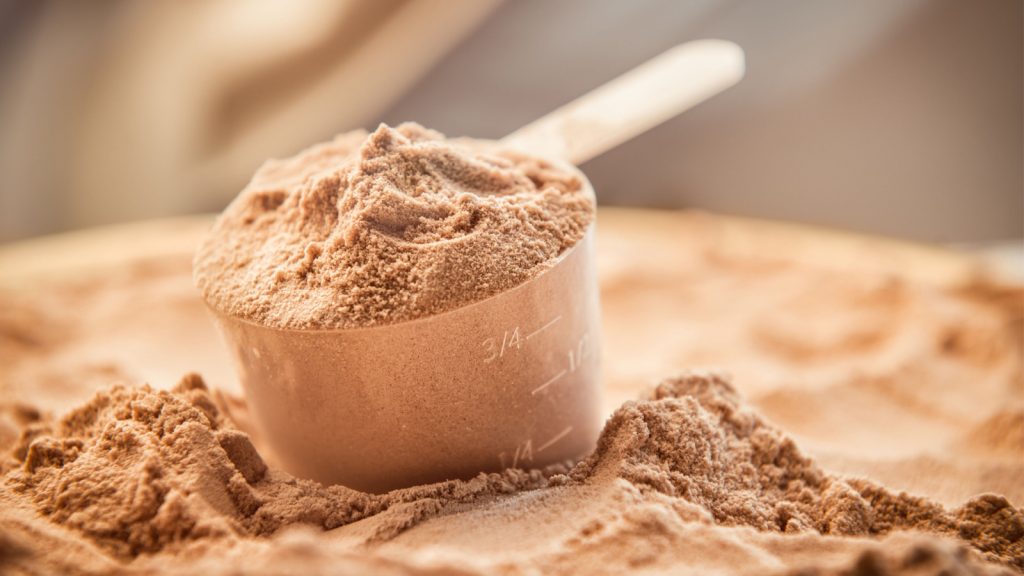
Several of our picks are high in protein and low in calories, carbs, and fats, which is ideal for those looking to develop leaner muscle gains. We included others, however, that, while high in protein, have a more balanced blend of macro- and micronutrients that can help you feel more full or assist with bulking.
Price
If you’re looking for natural ingredients and grass-fed dairy, you’re going to pay a bit more than you would for a traditional protein powder, which can cost anywhere from $0.60 to $1.20 per serving. Still, we tried to provide a wide range of products suitable to budgets both big and small.
Due to their high protein density and dearth of cheap additives, our picks range between $1.50 to $4.66 per serving, with several orbiting around $2. A few of our picks, however, provide monthly subscription options that can help you save anywhere from $0.10 to $1 per serving.
How Much Do Clean Protein Powders Cost?
Clean protein powders typically cost more than traditional protein powders, due in part to their lack of fillers and emphasis on sustainable sourcing. While many protein powders cost between $0.60 and $1.20 per serving, clean protein powders can cost anywhere from $1.50 to $5 per serving. On average, you can expect to pay around $2 per serving for a clean protein powder.
Protein powders on the higher end of the scale tend to also operate as meal replacements, and thus contain a hearty heaping of macros, micros, and proprietary blends in addition to a sizable hit of protein. Pricing may also be impacted by the addition of digestive enzymes, BCAAs, and macro splits low in carbs and fats.
Benefits of Clean Protein Powders
Protein is a key macronutrient for anyone hoping to build lean muscle and burn fat, and it can also assist with muscle recovery after workouts. (1)(9) Clean proteins can provide even more benefits, especially for those hoping to lose weight or struggling with allergy or digestive issues.
Can Help With Weight Loss
Protein is proven to help you feel fuller for longer than other macros, which is why it’s been scientifically linked to weight loss and weight maintenance. (10)(11) And since clean protein powders tend to be light on ingredients and devoid of artificial sweeteners and fillers, they’re often low in calories, carbs, and fats. Integrating them into a diet along with regular exercise can be a great way to stave off cravings without the extra calories.
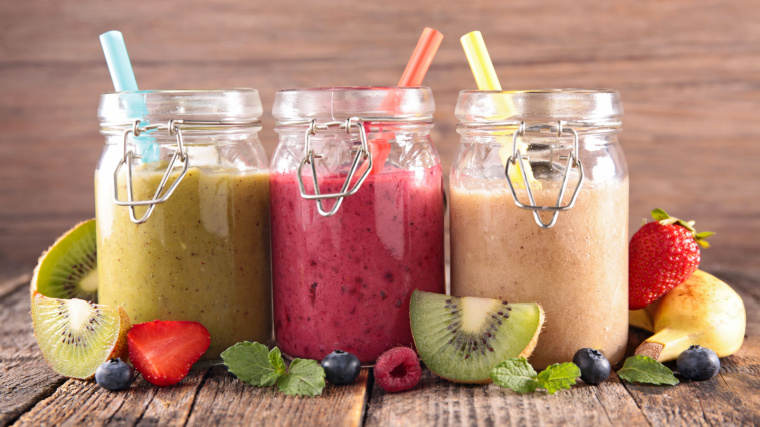
Casein can be especially helpful in this regard. It’s lower in lactose and digests more slowly than whey, meaning it can quell your appetite for longer periods. (12) The molecular structure of casein also lends itself to puddings, spreads, and ice creams better than whey, making for healthy and filling alternatives to traditionally indulgent snacks.
Cater to Allergies and Food Sensitivities
This is where the transparency you can expect from clean protein powders comes in handy. Clean protein powders tend to pride themselves on the ingredients they don’t have as much as the ones they do, and the majority of clean powders will proudly declare their lack of many common allergens, such as soy, nuts, lactose, and gluten. And if they do contain one, you can usually count on the label to make that abundantly clear.
Easier to Digest
Since they’re often devoid of lactose, gluten, and artificial ingredients, clean protein powders tend to be easier on the stomach than traditional powders. Many clean protein products even include probiotic blends or digestive enzymes that can help your body break the protein down into smaller particles to aid with absorption.
What To Consider Before Buying Clean Protein Powders
You and your protein powder are going to become well-acquainted. Like any relationship, it doesn’t help anyone to rush into it. Before picking up a tub, you’ll want to ask yourself what powders dovetail with your diet, fitness routine, and budget.
Your Dietary Needs
Some athletes look into clean protein sources because they’re sensitive about what they consume, while others are driven by necessity. If you’re vegan or allergic to soy, gluten, or lactose, that will factor into the kind of protein powder you’ll choose. If you’d rather not drink dairy that’s been touched by hormones or antibiotics, you’ll want to check out some of the grass-fed whey or casein options. Has your stomach reacted poorly to protein powders in the past? You might want to consider an option that’s rounded out by a digestive enzyme blend.
Your Fitness Goals
Your fitness goals will help you determine the macro split you’re looking for in a clean protein powder. Clean powders usually deliver between 20 and 30 grams of protein per serving, but the amount of carbs and fats will differ, as will the calories.

If you’re hoping to stay lean but pack on muscle, you’ll likely benefit from a whey isolate or casein powder that’s high in protein and low in carbs and fats. Those in hypertrophy training, on the other hand, will want a higher-calorie powder or meal replacement shake with more balanced macros. Powders can also be manipulated or stacked with additional foods and supplements to help you achieve your desired results. If you’re unclear about what split is right for you, this calculator should help point you in the right direction.
Price
Since you’ll be buying it by the tub (and fairly frequently), it’s good to know early on how much you’re willing to spend on a protein supplement. Clean protein powders generally run between $1.50 to $5 per serving, while ones with artificial ingredients and murky sourcing tend to go for less than $1 per serving.
Price is going to depend on several factors, with the type of protein, the macro split, the taste, and the quality of ingredients chief among them. If you’re on a budget, you’ll want to consider the areas where you can compromise and still achieve your goals.
Final Word
Protein is essential if you’re trying to build muscle, but high-protein diets can be tough to sustain. Protein powders help by packing 20 or more grams of pure protein into a single serving, but many supplements on the market are loaded with additives and allergens that can negatively impact your training. Thankfully, there is no shortage of clean protein powders that provide natural alternatives to artificial ingredients.
Our list of the best clean protein powders encompasses several different types of protein, from whey isolate and casein to plant-based options designed for vegans. Our picks also cater to different fitness goals with macro splits suited for cutting or bulking. Most importantly, they’re built around a small handful of natural ingredients that are good for muscles, easy on the gut, and shockingly tasty.
FAQs
What is clean protein powder?
Broadly speaking, clean protein powder has a trim list of natural ingredients that’s devoid of artificial sweeteners, preservatives, food dyes, and added sugars. Whey- and casein-based clean protein powders also tend to source their dairy from grass-fed, free-range cows. They also can remove common allergens like soy, gluten, and lactose.
What’s the best clean protein powder?
After factoring in quality, price, macros, and flavor variety, we chose Transparent Labs Whey Protein Isolate. This clean protein powder is ideal for those looking to cultivate lean muscle, as it balances 28 grams of protein with only 120 calories and a near-total lack of fats and carbs. Its whey isolate is sourced from grass-fed cows on American farms untouched by hormones and antibiotics, and its list of ingredients contains no gluten, added sugars, or artificial flavors. Perhaps most impressive? You can choose from 13 flavors.
Is whey or plant protein better?
Studies have shown that whey and plant-based protein can both be effective when it comes to muscle growth. (13) When it comes to overall health, on the other hand, there is evidence that plant-based protein sources can reduce markers of cardiovascular disease more effectively than animal-based protein. (14)(15)
References
- Antonio, J., Candow, D. G, Forbes, S. C,, Ormsbee, M. J., Saracino, P. G., Roberts, J. (2020). Effects of Dietary Protein on Body Composition in Exercising Individuals. Nutrients. 12(6), 1890.
- Townsend, J. R., Morimune, J. E., Jones, M. D., Beuning, C. N., Haase, A. A., Boot, C. M., Heffington, S. H., Littlefield, L. A., Henry, R. N., Marshall, A. C., Van Dusseldorp, T. A., Feito, Y., Mangine, G. T. (2020). The Effect of ProHydrolase® on the Amino Acid and Intramuscular Anabolic Signaling Response to Resistance Exercise in Trained Males. Sports (Basel). 8(2), 13.
- Boirie, Y., Dangin, M., Gachon, P., Vasson, M. P., Maubois, J.L., Beaufrère, B. (1997). Slow and fast dietary proteins differently modulate postprandial protein accretion. Proceedings of the National Academy of Sciences of the United States of America. 94(26), 14930-5.
- Hoffman, J. R., Falvo, M. J. (2004). Protein – Which is Best? Journal of Sports Science and Medicine. 3(3), 118-30.
- Arroyo-Cerezo, A., Cerrillo, I., Ortega, Á., Fernández-Pachón, M. S. (2021). Intake of branched chain amino acids favors post-exercise muscle recovery and may improve muscle function: optimal dosage regimens and consumption conditions. The Journal of Sports Medicine and Physical Fitness. 61(11), 1478-1489.
- Fouré, A., Bendahan, D. (2017). Is Branched-Chain Amino Acids Supplementation an Efficient Nutritional Strategy to Alleviate Skeletal Muscle Damage? A Systematic Review. Nutrients. 9(10), 1047.
- La Terra, S., Marino, V. M., Manenti, M. et al. (2010). Increasing pasture intakes enhances polyunsaturated fatty acids and lipophilic antioxidants in plasma and milk of dairy cows fed total mix ration. Dairy Science and Technology. 90, 687–698.
- Dhiman, T. R., Anand, G. R., Satter, L. D., Pariza, M. W. (1999). Conjugated linoleic acid content of milk from cows fed different diets. Dairy Science and Technology. 82(10), 2146-56.
- Davies, R. W., Carson, B. P., Jakeman, P. M. (2018). The Effect of Whey Protein Supplementation on the Temporal Recovery of Muscle Function Following Resistance Training: A Systematic Review and Meta-Analysis. Nutrients. 10(2), 221.
- Halton, T. L., Hu, F. B. (2004). The effects of high protein diets on thermogenesis, satiety and weight loss: a critical review. Journal of the American College of Nutrition. 23(5), 373-85.
- Veldhorst, M., Smeets, A., Soenen, S., Hochstenbach-Waelen, A., Hursel, R., Diepvens, K., Lejeune, M., Luscombe-Marsh, N., Westerterp-Plantenga, M. (2008). Protein-induced satiety: effects and mechanisms of different proteins. Physiology & Behavior. 94(2), 300-7.
- Dangin, M., Boirie, Y., Garcia-Rodenas, C., Gachon, P., Fauquant, J., Callier, P., Ballèvre, O., Beaufrère, B. The digestion rate of protein is an independent regulating factor of postprandial protein retention. American Journal of Physiology-Endocrinology and Metabolism. 280(2), E340-8.
- Messina, M., Lynch, H., Dickinson, J. M., Reed, K. E. (2018). No Difference Between the Effects of Supplementing With Soy Protein Versus Animal Protein on Gains in Muscle Mass and Strength in Response to Resistance Exercise. International Journal of Sport Nutrition and Exercise Metabolism. 28(6), 674-685.
- Li, S. S., Blanco Mejia, S., Lytvyn, L., Stewart, S. E., Viguiliouk, E., Ha, V., de Souza, R. J., Leiter, L. A., Kendall, C. W. C., Jenkins, D. J. A., Sievenpiper, J. L. (2020). Effect of Plant Protein on Blood Lipids: A Systematic Review and Meta-Analysis of Randomized Controlled Trials. Journal of the American Heart Association. 6(12), e006659.
- Lin, Y., Mouratidou, T., Vereecken, C., Kersting, M., Bolca, S., de Moraes, A. C., Cuenca-García, M., Moreno, L. A., González-Gross, M., Valtueña, J., Labayen, I., Grammatikaki, E., Hallstrom, L., Leclercq, C., Ferrari, M., Gottrand, F., Beghin, L., Manios, Y., Ottevaere, C., Van Oyen, H., Molnar, D., Kafatos, A., Widhalm, K., Gómez-Martinez, S., Prieto, L. E., De Henauw, S., Huybrechts, I. (2015). Dietary animal and plant protein intakes and their associations with obesity and cardio-metabolic indicators in European adolescents. Nutrition Journal. 14, 10.


